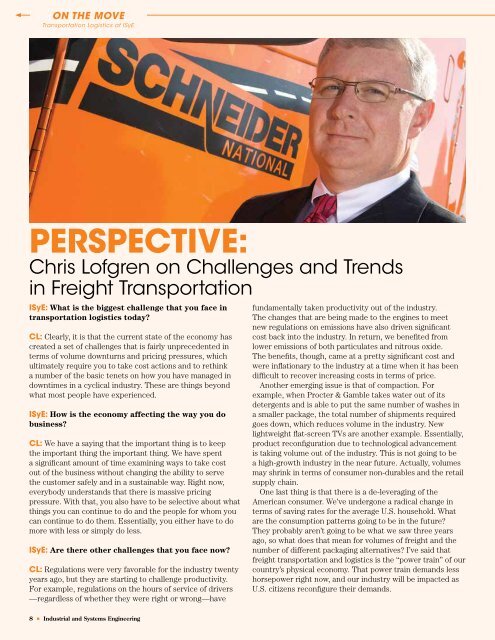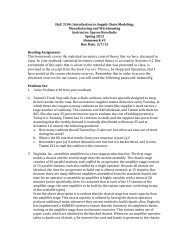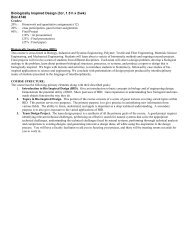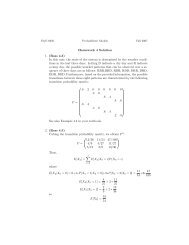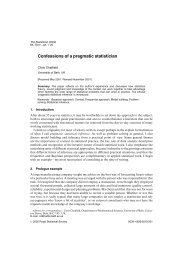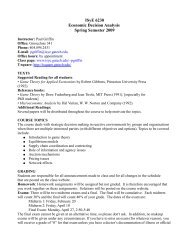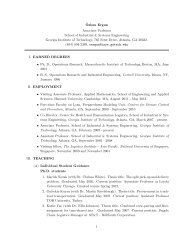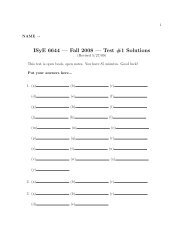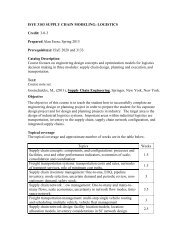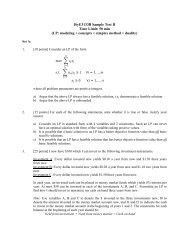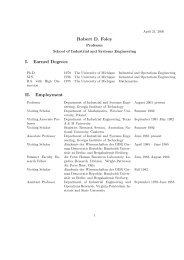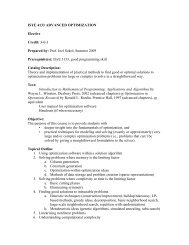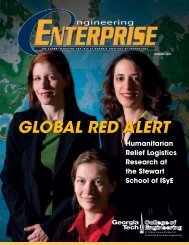Fall 2009 - H. Milton Stewart School of Industrial & Systems ...
Fall 2009 - H. Milton Stewart School of Industrial & Systems ...
Fall 2009 - H. Milton Stewart School of Industrial & Systems ...
Create successful ePaper yourself
Turn your PDF publications into a flip-book with our unique Google optimized e-Paper software.
ON THE MOVE<br />
Transportation Logistics at ISyE<br />
PERSPECTIVE:<br />
Chris L<strong>of</strong>gren on Challenges and Trends<br />
in Freight Transportation<br />
ISyE: What is the biggest challenge that you face in<br />
transportation logistics today?<br />
CL: Clearly, it is that the current state <strong>of</strong> the economy has<br />
created a set <strong>of</strong> challenges that is fairly unprecedented in<br />
terms <strong>of</strong> volume downturns and pricing pressures, which<br />
ultimately require you to take cost actions and to rethink<br />
a number <strong>of</strong> the basic tenets on how you have managed in<br />
downtimes in a cyclical industry. These are things beyond<br />
what most people have experienced.<br />
ISyE: How is the economy affecting the way you do<br />
business?<br />
CL: We have a saying that the important thing is to keep<br />
the important thing the important thing. We have spent<br />
a significant amount <strong>of</strong> time examining ways to take cost<br />
out <strong>of</strong> the business without changing the ability to serve<br />
the customer safely and in a sustainable way. Right now,<br />
everybody understands that there is massive pricing<br />
pressure. With that, you also have to be selective about what<br />
things you can continue to do and the people for whom you<br />
can continue to do them. Essentially, you either have to do<br />
more with less or simply do less.<br />
ISyE: Are there other challenges that you face now?<br />
CL: Regulations were very favorable for the industry twenty<br />
years ago, but they are starting to challenge productivity.<br />
For example, regulations on the hours <strong>of</strong> service <strong>of</strong> drivers<br />
—regardless <strong>of</strong> whether they were right or wrong—have<br />
fundamentally taken productivity out <strong>of</strong> the industry.<br />
The changes that are being made to the engines to meet<br />
new regulations on emissions have also driven significant<br />
cost back into the industry. In return, we benefited from<br />
lower emissions <strong>of</strong> both particulates and nitrous oxide.<br />
The benefits, though, came at a pretty significant cost and<br />
were inflationary to the industry at a time when it has been<br />
difficult to recover increasing costs in terms <strong>of</strong> price.<br />
Another emerging issue is that <strong>of</strong> compaction. For<br />
example, when Procter & Gamble takes water out <strong>of</strong> its<br />
detergents and is able to put the same number <strong>of</strong> washes in<br />
a smaller package, the total number <strong>of</strong> shipments required<br />
goes down, which reduces volume in the industry. New<br />
lightweight flat-screen TVs are another example. Essentially,<br />
product reconfiguration due to technological advancement<br />
is taking volume out <strong>of</strong> the industry. This is not going to be<br />
a high-growth industry in the near future. Actually, volumes<br />
may shrink in terms <strong>of</strong> consumer non-durables and the retail<br />
supply chain.<br />
One last thing is that there is a de-leveraging <strong>of</strong> the<br />
American consumer. We’ve undergone a radical change in<br />
terms <strong>of</strong> saving rates for the average U.S. household. What<br />
are the consumption patterns going to be in the future?<br />
They probably aren’t going to be what we saw three years<br />
ago, so what does that mean for volumes <strong>of</strong> freight and the<br />
number <strong>of</strong> different packaging alternatives? I’ve said that<br />
freight transportation and logistics is the “power train” <strong>of</strong> our<br />
country’s physical economy. That power train demands less<br />
horsepower right now, and our industry will be impacted as<br />
U.S. citizens reconfigure their demands.<br />
8 • <strong>Industrial</strong> and <strong>Systems</strong> Engineering


